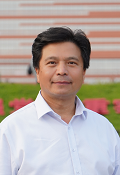IFCEST | Dr Richard Blanchard: A renewable climate friendly future?
Dr. Richard Blanchard is Head of Energy and Power Engineering Research at Loughborough University. He is a member of the Centre for Renewable Energy Systems Technology and head of the Renewable Energy for Development Research Group. He is a Senior Member of IEEE, the Association of European Renewable Energy Research Centers and has over 200 peer reviewed publications. He has graduated over a dozen PhDs and worked on international research projects with value in excess of £50million.
Title:
A renewable climate friendly future?
Abstracts:
Energy is the dominant controlling resource that has propelled human development from milling grain through to space exploration. Energy underpins nearly all activities in daily life. Fossil fuels provide 80% of today’s energy services around the world but release carbon dioxide (CO2) on their combustion. In a short period of human history that stretches back around 150 years CO2 levels have risen from 280ppm to around 420ppm and so far, has caused over 1oC. The legally binding Paris Agreement on Climate Change (2015) set a threshold rise of 1.5oC to mitigate against the worst effects of future global warming. The impact on the environment will be explained in this presentation using the IPARX model with a call for consideration of planetary boundaries and working within the limits of a global carbon budget.
To ensure society and the environment can continue to co-exist in a semblance of normality it is argued that a rapid switch away from fossil fuels to renewable energy is the only solution. This is not only to combat global warming but is premised by the finite nature of these resources. Nuclear fission is a low carbon resource with a high energy return on investment and can serve to help the transition in this century but is also finite, costly and fraught with delay construction and small modular reactors are unproven.
Polices have been put in place by national and local governments that commit to reaching Net-Zero by the middle of this century. However, there are challenges that will impact on the rate of decarbonisation due to the willingness and ability for society to change. A clear understanding of transition pathways that take into account actions and their impacts on energy service infrastructure will be presented. It is concluded that the time to decarbonise our energy systems is now and we are now living in a new climatic epoch, as the ability reduce atmospheric CO2 to pre-industrial levels may take hundreds of years to achieve.




.jpg)
.jpg)

